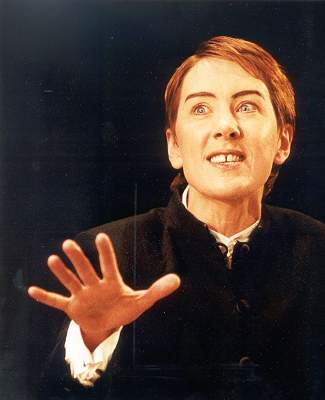|
<< -- 4 -- Roderic Dunnett APOTHEOSIS OF THE MADRIGAL

Seneca's demise -- a blood-red rearstage bath that becomes the tomb for
the ensuing scene ('My guiltless blood shall crimson my road to death')
-- like the simply conceived horizontal drop-flap that lowered or raised
to yield a cirrus-clouded Lullian Baroque heaven -- was a splendidly direct
piece of design by Poppea's economic designer, Jean-Marc Puissant.

Shirley Keane as Valetto. Photo © 2002 Jonathan Dockar-Drysdale
|
Shirley Keane's Valetto (this Irish soprano, a perky product of
London's fast-emerging Rose Bruford College in Sidcup, has as good an acting
as singing future), was as delightfully impish as the Icelandic Gudrun Olofsdottir
singing Lazuli, the trousers role hero in the Guildhall School's L'Etoile.
The Valletto's beige-background catwalk dalliance with his spry 'Damigella'
(the sensual Serving Maid, pertly and attractively sung by Lucy Crowe) looked
brazenly brilliant. Seneca is the past : these two are the future.

Vassilis Kostopoulos as Seneca. Photo © 2002 Jonathan Dockar-Drysdale
|
But L'Incoronazione di Poppea hinges on Nero and his assorted
women, the spurned wife (Claudius' daughter Octavia, sister of the doomed
Britannicus) and Poppea, Ottone's wife and the imperial bit on the side,
whom Amore from the outset plots to raise to royalty. Rebecca Cooper's
dominant Nero, a humdinger of a performance which I greatly enjoyed, had
charged persona and a satisfying full tone which she bangs out with aplomb.
An exciting, dangerous presence. But Cooper tends to approach an (at best)
uncertain vibrato from beneath and overemphasises each phrase, at times
almost monotonously, to the detriment of musical phrasing, where a little
more 'give' would help. Some maturing still to come, then, though larger-scale
Handel certainly beckons.

Rebecca Cooper as the amorous Nero, on the phone to Poppea. Photo © 2002 Jonathan Dockar-Drysdale
|
Cooper excelled most where Nero blasts, hurling Seneca's books,
which were positively balooning out of his musty study, with boyish glee
into his tomb -- aided by his crony, Adrian Clarke's Lucano -- oddly scripted
: Lucan ('Pharsalia'), was actually a poet himself, and Seneca's nephew;
cooing over Poppea's breasts down a mobile phone (ubiquitous in opera
these days, but still fun); or dispensing an unexpected dose of 'La Clemenza
di Nerone' -- the despot seems to have learned at least something from his
Stoic tutor -- in pardoning Ottone and the loyal Drusilla, nicely characterised
by Stockholm-trained Jenny Ohlson, at the close. Nero's sudden switch of
dynamic to address the last, 'e tu' -- he might almost have been addressing
Poppea herself -- was Cooper's best vocal moment all evening, for it confirmed
earlier suggestions that she, too, can deliver real emotional variety --
and even pathos -- when called upon.
Continue >>
Copyright © 13 December 2002
Roderic Dunnett, Coventry, UK

|

